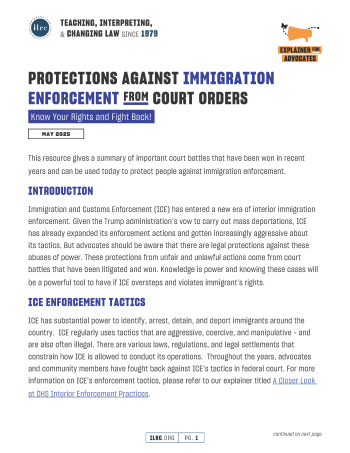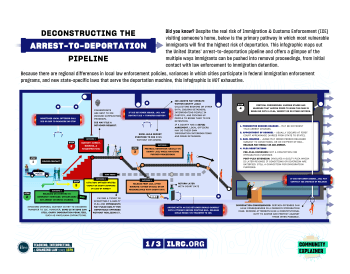Term Page
Community Resources
The U.S. Department of Justice has issued a new rule that changes how immigration appeals are handled. The new rule shortens the time you have to appeal—which is how you ask for another court to review an unfavorable decision from an immigration judge.
Recently, the Department of Justice (DOJ) published a memo listing out its priorities for civil enforcement cases. In that memo, the DOJ states that it will be focusing on denaturalization cases. This memo - along with statements made by administration officials and members of congress - has sparked a lot of attention on denaturalization and questions about who could be denaturalized. This has caused a lot of fear and uncertainty in communities, but denaturalization is not as straightforward as you might think.
In this Resource Toolkit, we will address recent changes affecting students and school campuses and what students, parents and caregivers, and school administrators can do to prepare for immigration enforcement action at schools while highlighting the constitutional protections that remain a pillar of our democracy.
Community members across the country are reporting visits from immigration and other federal officers seeking to meet with certain children who entered the United States unaccompanied. These children are often referred to as “unaccompanied children” (UCs) because at the time they were arrested by immigration (such as crossing the border), they were not with a parent or legal guardian. Although these visits are sometimes described as “wellness checks,” they are part of a broader, coordinated effort to locate and deport some vulnerable young people and their sponsors. It is crucial for families and immigrant communities to stay informed, exercise their rights, and seek legal support when needed.
The ILRC has prepared free, downloadable signs to help you let your local communities know that you stand with them! Tell ICE that you are prepared to defend your guests, patrons, students, patients, or clients from unlawful entry or intimidation.

Given the Trump administration’s vow to carry out mass deportations, ICE has already expanded its enforcement actions and gotten increasingly aggressive about its tactics. But advocates should be aware that there are legal protections against these abuses of power. These protections from unfair and unlawful actions come from court battles that have been litigated and won. Knowledge is power and knowing these cases will be a powerful tool to have if ICE oversteps and violates immigrant’s rights.

Despite the real risk of Immigration & Customs Enforcement (ICE) visiting someone’s home, below is the primary pathway in which most vulnerable immigrants will find the highest risk of deportation. This infographic maps out the United States’ arrest-to-deportation pipeline and offers a glimpse of the multiple ways immigrants can be pushed into removal proceedings, from initial contact with law enforcement to immigration detention. Because there are regional differences in local law enforcement policies, variances in which cities participate in federal immigration enforcement programs, and new state-specific laws that serve the deportation machine, this infographic is NOT exhaustive.
A flyer that outlines 5 key reminders about your constitutional rights when confronted by Immigration and Customs Enforcement (ICE).
Your green card is proof of your status. If you lose it or it expires, you are still a permanent resident. Permanent Residence is a status—only an immigration judge can take away your permanent residence. Permanent residents should carry their green card (or at a minimum a copy of it).
Many people who were granted parole to enter the United States, or received a parole document at or after entry, are receiving notices saying that their parole status, and any work permit related to it, is being terminated.
While the notice says you should depart immediately, you may be entitled to pursue applications for immigration benefits or the right to stay. Many people who have already filed applications or are in court have permission to remain in the U.S. while those cases are pending. In some instances, these notices were issued in error. If you have received this notice, you should speak to a trusted immigration legal services provider about your options.
On April 14, 2025, a federal judge blocked the termination of parole for those that came under a parole program from Cuba, Haiti, Nicaragua, or Venezuela, for those whose parole was terminated with a general notice without any reasons that are specific to your case. If you fit this category and received a generic notification by email or through your USCIS online account, your parole remains valid. If you are not sure whether you fit this category, speak with a trusted legal services provider. Stay in touch with a trusted legal organization, there will be updates.
While the notice says you should depart immediately, you may be entitled to pursue applications for immigration benefits or the right to stay. Many people who have already filed applications or are in court have permission to remain in the U.S. while those cases are pending. In some instances, these notices were issued in error. If you have received this notice, you should speak to a trusted immigration legal services provider about your options.
On April 14, 2025, a federal judge blocked the termination of parole for those that came under a parole program from Cuba, Haiti, Nicaragua, or Venezuela, for those whose parole was terminated with a general notice without any reasons that are specific to your case. If you fit this category and received a generic notification by email or through your USCIS online account, your parole remains valid. If you are not sure whether you fit this category, speak with a trusted legal services provider. Stay in touch with a trusted legal organization, there will be updates.